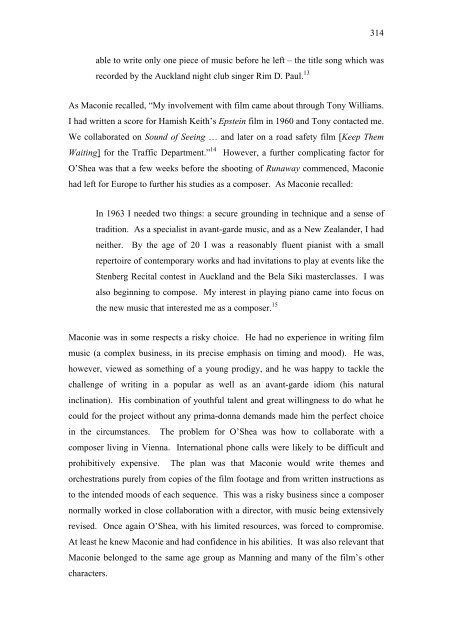Copyright Statement - ResearchSpace@Auckland
Copyright Statement - ResearchSpace@Auckland
Copyright Statement - ResearchSpace@Auckland
You also want an ePaper? Increase the reach of your titles
YUMPU automatically turns print PDFs into web optimized ePapers that Google loves.
314<br />
able to write only one piece of music before he left – the title song which was<br />
recorded by the Auckland night club singer Rim D. Paul. 13<br />
As Maconie recalled, “My involvement with film came about through Tony Williams.<br />
I had written a score for Hamish Keith’s Epstein film in 1960 and Tony contacted me.<br />
We collaborated on Sound of Seeing … and later on a road safety film [Keep Them<br />
Waiting] for the Traffic Department.” 14 However, a further complicating factor for<br />
O’Shea was that a few weeks before the shooting of Runaway commenced, Maconie<br />
had left for Europe to further his studies as a composer. As Maconie recalled:<br />
In 1963 I needed two things: a secure grounding in technique and a sense of<br />
tradition. As a specialist in avant-garde music, and as a New Zealander, I had<br />
neither. By the age of 20 I was a reasonably fluent pianist with a small<br />
repertoire of contemporary works and had invitations to play at events like the<br />
Stenberg Recital contest in Auckland and the Bela Siki masterclasses. I was<br />
also beginning to compose. My interest in playing piano came into focus on<br />
the new music that interested me as a composer. 15<br />
Maconie was in some respects a risky choice. He had no experience in writing film<br />
music (a complex business, in its precise emphasis on timing and mood). He was,<br />
however, viewed as something of a young prodigy, and he was happy to tackle the<br />
challenge of writing in a popular as well as an avant-garde idiom (his natural<br />
inclination). His combination of youthful talent and great willingness to do what he<br />
could for the project without any prima-donna demands made him the perfect choice<br />
in the circumstances. The problem for O’Shea was how to collaborate with a<br />
composer living in Vienna. International phone calls were likely to be difficult and<br />
prohibitively expensive. The plan was that Maconie would write themes and<br />
orchestrations purely from copies of the film footage and from written instructions as<br />
to the intended moods of each sequence. This was a risky business since a composer<br />
normally worked in close collaboration with a director, with music being extensively<br />
revised. Once again O’Shea, with his limited resources, was forced to compromise.<br />
At least he knew Maconie and had confidence in his abilities. It was also relevant that<br />
Maconie belonged to the same age group as Manning and many of the film’s other<br />
characters.















